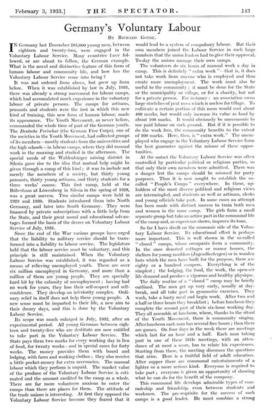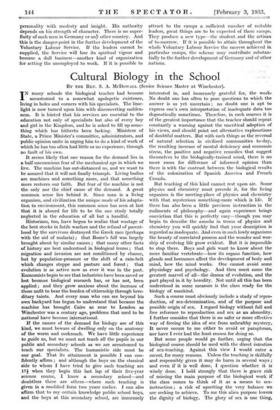Germany's Voluntary Labour BY RICHARD GOTHE.
IN Germany last December 285,000 young men, between
eighteen and twenty-two, were engaged in the Voluntary Labour Service. Many countries have fol- lowed, or are about to follow, the Gelman example. What is the novel and distinctive feature of this form of human labour and community life, and how has the Voluntary Labour Service come into being ?
It was not ordered from above, but grew up from below. When it was established by law in July, 1931, there was already a strong movement for labour camps, which had accumulated much experience in the voluntary labour of private persons. The camps for artisans, peasants and students were the first in which this new kind of training, this new form of human labour, made its appearance. The Youth Movement, as never before, commanded the whole time of part of the German youth. The Deutsche Freischar (the German Free Corps), one of the societies in the Youth Movement, had collected groups of its members—mostly students from the universities and the high schools—in labour camps, where they did manual work in the morning and studied in the afternoon. The special -needs of the Waldenbtirger mining district in Silesia gave rise to the idea that mutual help might be given through a camp of this kind ; it was to include not merely the members of a society, but thirty young peasants, thirty young artisans, and thirty students for a three -weeks' course. This first camp, held at the Baberhaus at Lowenberg in Silesia in the spring of 1928, was a great success. Two similar camps were held in 1929 and 1930. Students introduced them into North Germany, and later into South Germany. They were financed by private subscriptions with a little help from the State, and their great moral and educational advan- tages formed the basis of the decree on Voluntary Labour Service of July, 1931.
Since the end of the War various groups have urged that the liability to military service should be trans- formed into a liability to labour service. The legislators held that the labour service must be voluntary, and this principle is still maintained. When the Voluntary Labour Service was established, it was regarded as a means of relieving unemployed youth. There are over six Million unemployed in Germany, and more than a million of them are young people. They are specially hard hit by the calamity of unemployment ; having had no work for years, they lose their self-respect and self- confidence. They develop an inferiority complex. Ordi- nary relief in itself does not help these young people. A new sense must be imparted to their life, a new aim to their dreary days, and this is done by the Voluntary Labcair Service.
Its scope was much enlarged in July, 1932, after an experimental period. All young Germans between eigh- teen and twenty-five who are destitute are now entitled to take part in the Voluntary Labour Service. The State pays them two marks for every working day in lieu of food, for twenty weeks—and in special cases for forty weeks. The money provides them with board and lodging, with fares and working clothes ; they also receive a little pocket-money for extra necessaries. The manual
labour which they perform is unpaid. The market value of the produce of the Voluntary Labour Service is esti- mated and the amount credited to the camp as a whole. There are far more volunteers anxious to enter the camps than there are places for them. The attitude of the trade unions is interesting. At first they opposed the Voluntary Labour Service because they feared that it would lead to a system of compulsory labour. But their own members joined the Labour Service in such large numbers that the union leaders had to give their approval. To-day the unions manage their own camps.
The volunteers do six hours of manual work a day in camp. This is definitely " extra work "—that is, it does
not take work from anyone who is employed and thus create more unemployment. The work must also be useful to the community ; it must be done for the State or the municipality or .% illage, or for a charity, but not for a private person. For instance : an association owns large stretches of peat moss which is useless for tillage. To cultivate a certain portion of this moss would cost about 400 marks, but would only increase its value as land by about 100 marks. It would obviously be uneconomic to use paid labour on such ground. But if it is possible to do the work free, the community benefits to the extent of 100 marks. Here, then, is " extra work." The unem- ployed who engage in the Voluntary Labour Service form the best guarantee against the misuse of these oppor- tunities.
At the outset the Voluntary Labour Service was often controlled by particular political or religious parties, so that only their own members were admitted. There was a danger lest the camps should be misused for party purposes. Thus it is now sought to establish the so- called " People's Camps " everywhere. In these, up'- holders of the most diverse political and religious views are intermingled, and students as well as artisans, clerkS and young officials take part. In some cases an attempt has been made with distinct success to train both men and women in the same camp. The girls form a small separate group but take an active part in the communal life' of the camp and, as experience shows, improve its tone.
So far I have dwelt on the economic side of the Volun- tary Labour Service. Its educational effect is perhaps more important. This is well shown in the so-called " closed " camps, whose occupants form a community. In the once deserted cottages or manor houses, the shelters for young ramblers (Jugendherbergen) or in wooden huts which the men have built for the purpose, there are eighty or a hundred campers. Everything is of the simplest ; the lodging, the food, the work, the open-air life demand and produce a vigorous and healthy physique.
The daily routine of a " closed " camp may be briefly outlined. The men get up very early, usually at day- break, and all take part in gymnastic exercises. They wash, take a hasty meal and begin work. After two and a half or three hours they breakfast ; before luncheon they complete the second part of their six-hour working day. They all assemble at luncheon, where, thanks to the ritual of the Youth Movement, there is community singing. After luncheon each man has several free hours ; then there are games. On four days in the week there are meetingS which last for an hour and a half. Each man taking part in one of these little meetings, with an atten- dance of at most a score, has to relate his experiences. Starting from these, the meeting discusses the questions that arise. Here is a fruitful field of adult education. After supper there are communal entertainments of a lighter or a more serious kind. Everyone is required to take part ; everyone is given an opportunity of showing what he can do for the benefit of the company.
This communal life develops admirable types of com- radeship and friendship, even between students and workmen. The pm-requisite for the success of such camps is a good leader. He must combine a strong personality with modesty and insight. His authority depends on his strength of character. There is no super- fluity of such men in Germany or any other country. And this is the danger-point in the further development of the Voluntary Labour Service. If the leaders cannot be supplied, the Service will lose its spiritual vigour and become a dull business—another kind of organization for setting the unemployed to work. If it is possible to attract to the camps a sufficient number of suitable leaders, great things are to be expected of these camps. They produce a new type—the student and the artisan of to-morrow. If it is possible to attain throughout the whole Voluntary Labour Service the success achieved in particular camps, the scheme may contribute substan- tially to the further development of Germany and of other nations.





































 Previous page
Previous page